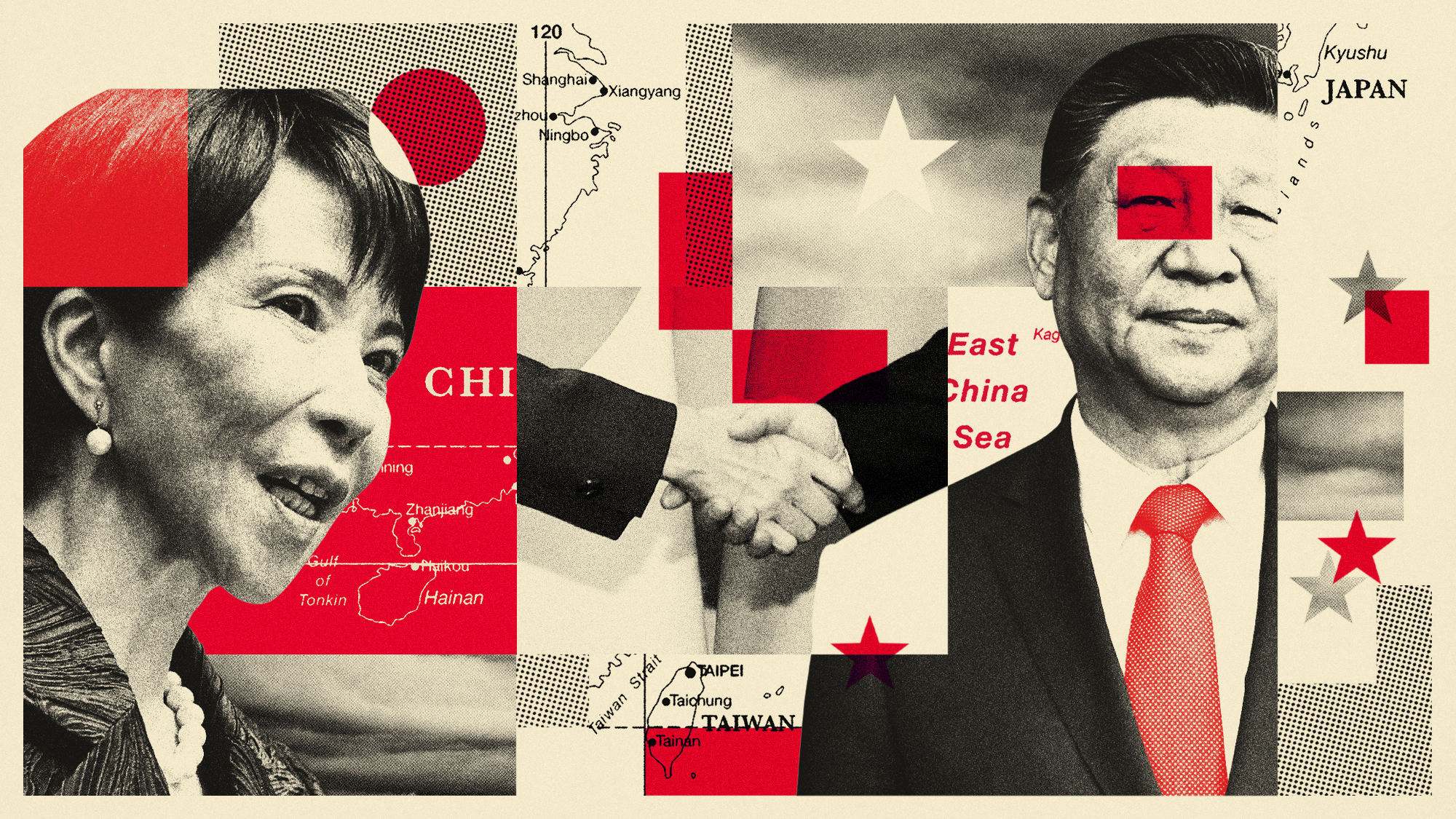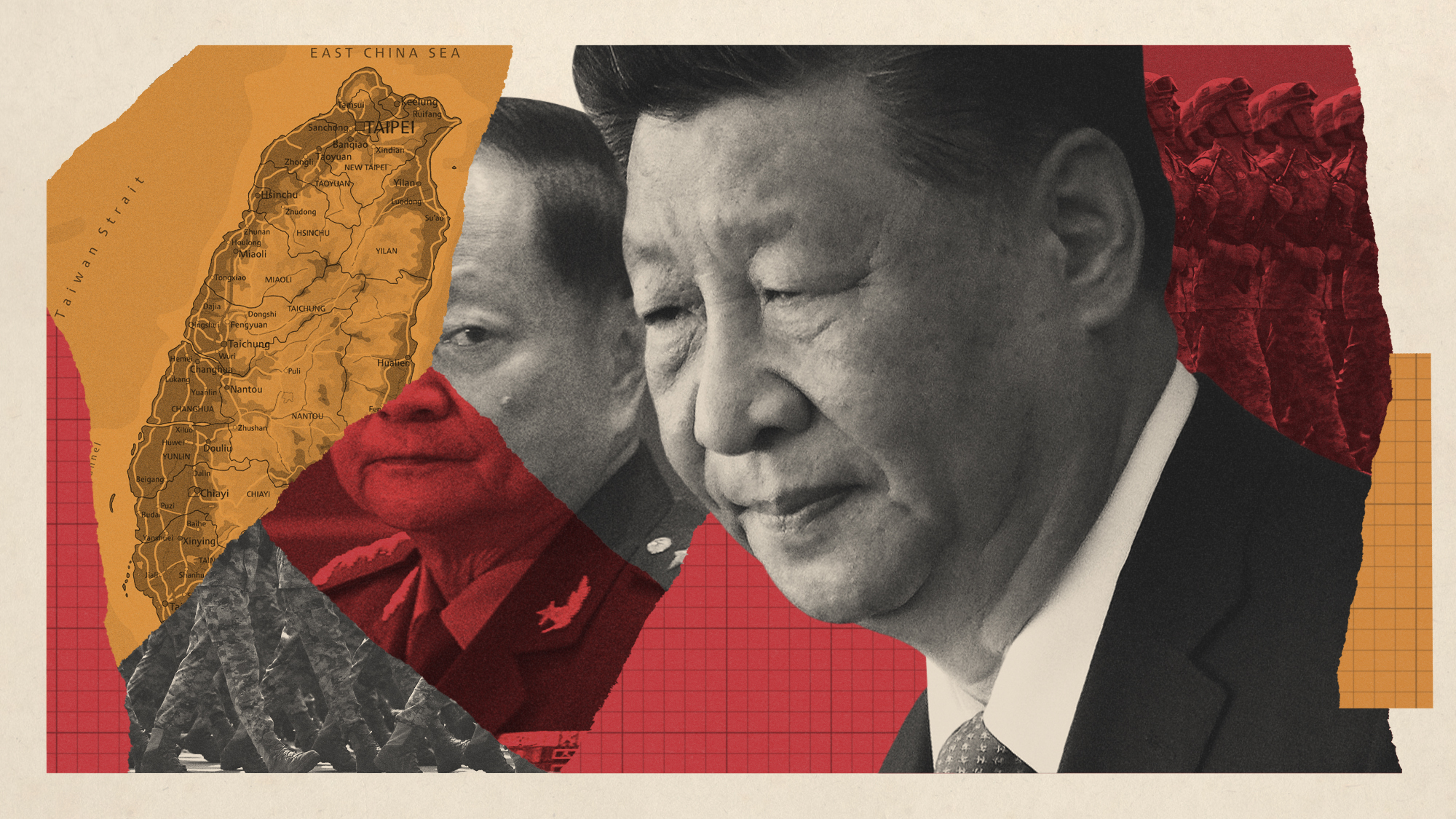Why are China and Japan fighting over Taiwan?
Comments on Taiwan draw Beijing's rebuke


A free daily email with the biggest news stories of the day – and the best features from TheWeek.com
You are now subscribed
Your newsletter sign-up was successful
China and Japan exchanged angry words in recent days after Japan’s new prime minister said her country would regard an attack on Taiwan as an “existential threat” to security in the region. The two countries are in a “furious diplomatic spat” over the comments, said NBC News. Japanese Prime Minister Sanae Takaichi’s “unusually explicit" remarks suggested Chinese military action against Taiwan could force an armed response from Tokyo.
Japanese leaders have usually been vague about their commitments to Taiwan, just 70 miles from their country's territory. But China regards the self-ruled island of Taiwan as its possession, and officials responded with angry demands for a Japanese retraction. “The dirty neck that sticks itself in must be cut off,” said Xue Jian, a Chinese diplomatic official, on X. (The post was later deleted.)
Other Chinese leaders were less colorful but still pointed in their comments, said Reuters. Japan would suffer a “crushing defeat” if it intervened in Taiwan, said Chinese Defense Ministry spokesperson Jiang Bin. The grievances are rooted in a long and contentious history, said Reuters. There is “ongoing tension” between the two countries lingering from the Japanese invasion of China during World War II.
The Week
Escape your echo chamber. Get the facts behind the news, plus analysis from multiple perspectives.

Sign up for The Week's Free Newsletters
From our morning news briefing to a weekly Good News Newsletter, get the best of The Week delivered directly to your inbox.
From our morning news briefing to a weekly Good News Newsletter, get the best of The Week delivered directly to your inbox.
What did the commentators say?
Some observers see China’s angry response to Takaichi as a return to its “wolf warrior” days of the early 2020s, Jessie Yeung said at CNN. That is when Beijing officials would “hit back directly — and often colorfully” at criticisms of their country. That aggressive approach receded as Communist officials sought to “win back lost goodwill among Western nations.” But there is a “significant streak of anti-Japanese sentiment” in China, and the prime minister’s comments have prompted “state media and other prominent voices” to fan outrage against Tokyo.
The dispute illustrates the “essence of Japan’s strategic dilemma,” said Zheng Zhihua at The Diplomat. Tokyo wants to “signal deterrence” and send a message of solidarity with its U.S. ally. But it must also do so within the “constitutional limits of its pacifist defense policy.” Japan has also attempted to balance its relations with China with “unofficial” contacts with Taiwan, a “dual track” policy that allows it to “avoid direct confrontation with Beijing while supporting Taiwan’s stability.” The question now is whether Japan can maintain its “maneuvering space” or if the spat “hardens public attitudes on both sides.”
What next?
China “escalated its diplomatic feud” on Sunday, said The New York Times. It sent ships to patrol uninhabited islands that “both countries claim” while also warning Chinese students in Japan about unspecified threats to their safety. On Monday, Japan said it scrambled warplanes after detecting a suspected Chinese drone near the island of Yonaguni, said CBS News. “We are trying not to escalate the situation,” said one Japanese official.
The growing tensions have raised fears of a “rupture in Japan-China ties,” said The Japan Times. There may be more escalation to come. Beijing is prepared to “carry out substantial countermeasures against Japan,” a social media account run by state media said on Sunday.
A free daily email with the biggest news stories of the day – and the best features from TheWeek.com
Joel Mathis is a writer with 30 years of newspaper and online journalism experience. His work also regularly appears in National Geographic and The Kansas City Star. His awards include best online commentary at the Online News Association and (twice) at the City and Regional Magazine Association.
-
 What is the endgame in the DHS shutdown?
What is the endgame in the DHS shutdown?Today’s Big Question Democrats want to rein in ICE’s immigration crackdown
-
 ‘Poor time management isn’t just an inconvenience’
‘Poor time management isn’t just an inconvenience’Instant Opinion Opinion, comment and editorials of the day
-
 Bad Bunny’s Super Bowl: A win for unity
Bad Bunny’s Super Bowl: A win for unityFeature The global superstar's halftime show was a celebration for everyone to enjoy
-
 How are Democrats turning DOJ lemons into partisan lemonade?
How are Democrats turning DOJ lemons into partisan lemonade?TODAY’S BIG QUESTION As the Trump administration continues to try — and fail — at indicting its political enemies, Democratic lawmakers have begun seizing the moment for themselves
-
 How did ‘wine moms’ become the face of anti-ICE protests?
How did ‘wine moms’ become the face of anti-ICE protests?Today’s Big Question Women lead the resistance to Trump’s deportations
-
 The UK expands its Hong Kong visa scheme
The UK expands its Hong Kong visa schemeThe Explainer Around 26,000 additional arrivals expected in the UK as government widens eligibility in response to crackdown on rights in former colony
-
 ‘Hong Kong is stable because it has been muzzled’
‘Hong Kong is stable because it has been muzzled’Instant Opinion Opinion, comment and editorials of the day
-
 How are Democrats trying to reform ICE?
How are Democrats trying to reform ICE?Today’s Big Question Democratic leadership has put forth several demands for the agency
-
 Japan’s Takaichi cements power with snap election win
Japan’s Takaichi cements power with snap election winSpeed Read President Donald Trump congratulated the conservative prime minister
-
 What do Xi’s military purges mean for Taiwan?
What do Xi’s military purges mean for Taiwan?Today’s Big Question Analysts say China’s leader is still focused on reunification
-
 Why is Tulsi Gabbard trying to relitigate the 2020 election now?
Why is Tulsi Gabbard trying to relitigate the 2020 election now?Today's Big Question Trump has never conceded his loss that year
